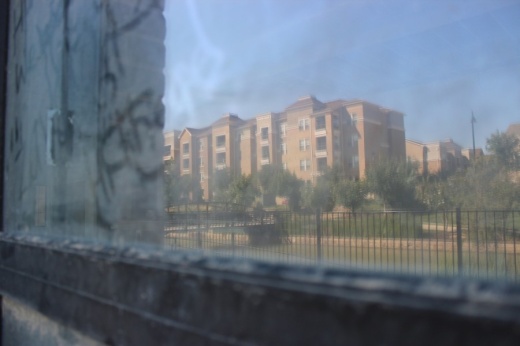It's etched on the dust-covered windows of one of the property’s empty restaurant buildings.
“Hurry and finish—we want margaritas!” one finger-scribbled message reads.
For now, those vacant restaurant structures lie at the heart of one of Flower Mound’s most anticipated developments.
More than a decade after the first developer laid out a vision for the 158-acre property, the restaurant portion of the site is facing yet another setback due to the economy.
Unlike the Great Recession, which affected the project as it was getting off the ground in 2008, the current downturn was brought about by a deadly virus and by resulting health measures that have made many residents more reluctant to eat out.
“It’s gone through its trials and tribulations at no fault, really, of the current developer,” said Andrea Roy, the town’s economic development director.
The economic jolt has not stopped the current developer, Centurion American, from making progress on the next phases of construction.
“Construction and finish out continues and has progressed greatly on the River Walk restaurants even during the pandemic,” Centurion American spokesperson Courtney Morrow said in a statement. “While we don’t have a firm opening date for our signature dining concepts, we look forward to announcing more within the next 1-2 months.”
In recent weeks, crews have worked to erect a series of long-planned mixed-use buildings on the western side of the development.
The property’s chapel and event center is being finished out, and may hold its first events before the end of the year, Morrow said.
Developers have also submitted plans to the town for the project’s prominent amphitheater, a farmer’s market, and splash pad and promenade additions. A second hotel, Home2 Suites, is also under construction. It will join the existing Courtyard by Marriott.
But some Flower Mound residents are still eager to know when the restaurants are expected to come online.
“Everybody wants to know when they’re opening, which is—we don’t know,” town spokesperson Molly Fox said.
Snags and progress
Visit the Riverwalk today, and the heart of the development is a juxtaposition of babbling water features, active residential communities and the six empty restaurant spaces the developer is seeking to fill.
Those residential features across the street from the restaurants have been particularly healthy parts of the development, Roy said.
“As far as the residential components—the apartments, the single-family homes, the townhomes—there’s no problem with residential out there,” Roy said. “That happens without any issues. It’s just that commercial component that’s so difficult.”
In addition to economic challenges the development has faced, the property has undergone several changes in ownership.
When construction kicked off in 2008, the country was already in a deep recession brought on by the housing crisis.
Two years later, the property entered foreclosure and was acquired by a second owner. It wasn't until 2013—a half decade after the project’s start—that Centurion American bought most of the land, and construction on much of the heart of the development began in earnest.
After acquiring the property, developer Mehrdad Moayedi re-evaluated the previous plans for the development and made a series of detailed changes, including adding an amphitheater and other components of the current plan. The change in ownership effectively set back parts of the project to a more formative stage, Roy said.
Earlier this year, the town approved permits for three restaurants on the Riverwalk: Primo’s, Tillman’s and Scout. Within days of that decision, every restaurant across the state was forced to shut down its dine-in area as a precaution against the spread of the coronavirus. Opening new restaurants in that environment was a non-starter, although dining areas are now allowed to reopen at 75% capacity across the state.
Since the permits were approved, Tillman’s has been replaced by Sfereco, a new Italian concept that recently opened in the Statler development in Dallas, Morrow said.
Fox said the town has done everything it can to facilitate the permit process for the restaurants, but ultimately, it is up to the developer to set the timeline.
“I do think there’s some confusion that the community thinks the town has some control over the timeline of the development,” Fox said.
Flower Mound economic development department staffers expect market conditions to play a role in the timeline for the project’s completion—and particularly for the restaurant openings, Roy said.





